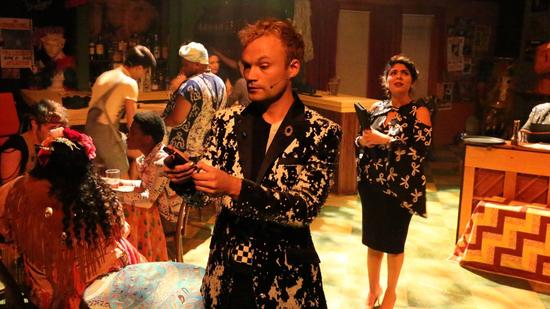
A port city whose coastal elevation mandates cemetery repositories above the ground surface is almost guaranteed to have a rich necrology, but the legacy of the 1973 UpStairs Lounge holocaust remained buried until 2016, when the torching of a gay club in Orlando, Florida, spurred two playwrights to initiate investigation into the long-forgotten atrocity. One of these was Wayne Self's Upstairs: The Musical, based on journalist Clayton Deleny's “The Up Stairs Lounge Arson.” The other, by Max Vernon, is The View UpStairs, currently in previews at the Pride Arts Center Broadway, produced by Circle Theater and directed by Derek Van Barham. Mary Shen Barnidge: Both plays are fictionalized accounts, but Self's chronicle begins amid the charred ruins of the crime scene with the survivors confronting the ghosts of the victims, so we know from the outset that our story will not end happily. The View UpStairs, however, opens in the present day, with New York expat and would-be fashion designer Wes surveying his newly purchased property in the Crescent City's venerated French Quarter, only to suddenly find himself catapulted a near half-century back to the site's glory days. Barnidge: So Wes, in his capacity as a time-traveler, is not so much like Marty McFly as he is like Mark Twain's “Connecticut Yankee”—a naive "our guide" whose point of view reflects that of the audience. Barnidge: What made you decide that this play needed a musical score? Barnidge: What do you think we—both those of us with first-hand memories of that time, as well as those not yet born—can learn today from the world portrayed in the play? Barnidge: What do you hope the audience will take away from the show?
Max Vernon: The audience can interpret this narrative device as restless spirits haunting the place they called home, or as a bit of New Orleans voodoo, or—as Wes, himself, suggests—the residual effects of hallucinogenics in the cocaine he ingested earlier. My intent was for the location to illustrate two disparate eras of Queer life that can then talk to one another.
Vernon: Yes! Without that inter-generational contrast, we would have a whole different play.
Vernon: The actual UpStairs Lounge had a full-time piano player for sing-alongs, besides staging its own drag shows and amateur theatricals ( "Nellydramas" )—so the music was always part of the ambience. From the standpoint of our musical, though, it allows us to go on a deeper emotional journey with the characters and community.
Van Barham: Music is also such a key element for this time period. Even if this hadn't been a musical, I would have insisted on a jukebox underscore of period hits.
Vernon: What cruising was like before smart phones and social media, for one, and the serious dangers of being gay in the south not so very long ago, for another—and the courageous people who fought oppression to make our path a little easier. The importance of community, too, and how far we've come in the 35 years since that now almost-forgotten moment in our history.
Vernon: The UpStairs Lounge was a sanctuary, where people could be their own authentic selves. The way for us to honor their loss is by creating new places for connection—because there will never be a perfect time to be alive. Things will always be both wonderful and horrible. Socially and culturally, we are in a constant state of evolution and crisis, progress and backlash. This means that we can't sit around waiting for utopia to come to us, but have to make it ourselves.
